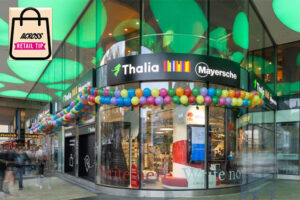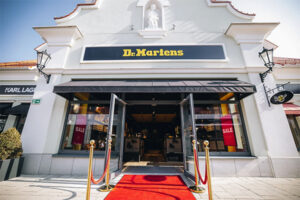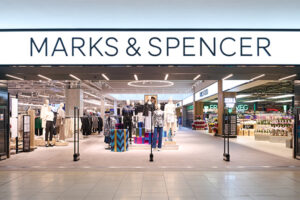Vero Moda
Few people are familiar with the Danish Povlsen retail family, but they know their textile retail chains. Especially Jack&Jones, Only, Bestseller, and Vero Moda. In 1975, the Povlsen couple opened their first boutique under the name Pigalle, and now the family business includes around 2,600 stores in about three dozen countries. The founders’ eldest son, Anders Holch Povlsen, is the company’s CEO. The fashion empire’s most recent turnover was estimated to be around 3.5 billion euros.
Primark
The Dublin-based textile discounter Primark is a subsidiary of the British food corporation Associated British Foods (ABF). ABF was founded by Canadian-born Garfield Weston, who commissioned Irish expatriate Arthur Ryan to set up a discount chain in 1969. Today, this chain has almost 400 locations and made a turnover of the equivalent of 6.4 billion euros in 2020. That makes Primark ABF’s cash cow, so to speak. Ryan was chairman of the board until 2009. Today, the majority of the company’s shares belong to the descendants of Garfield Weston.
Esprit
In the 1970s, Douglas Tompkins and his then-wife Susie Russel founded Esprit in California. Prior to that, the two had already ramped up the outdoor fashion brand The North Face and silvered their shares in the company. The couple’s marriage didn’t last. After the divorce, Tompkins sold his Esprit shares to Susie Russel in 1989 for a reported $250 million and moved to Chile, where he made a name for himself as an environmental activist. Susie Russel, known to those interested in politics for her support of the Clintons in the election campaign, also later divested herself of her Esprit shares. Today, Esprit’s headquarters are in Ratingen (North Rhine-Westphalia), and the Group is listed on the Hong Kong Stock Exchange.
Mango
Spanish retail chain Mango (based in Barcelona) was founded in 1984 by Turkish-born Isak Andic, who emigrated with his family from Istanbul to Spain in 1969. He has built Spain’s second-largest fashion chain, catapulting himself into the ranks of Spain’s richest persons. Sales in 2020 amounted to 1.84 billion euros. Isak Andic, known as an art collector, is still the head of the company, and his son Jonathan has been with the company since 2005.
Zara
Behind Zara is the Spanish entrepreneur Armancio Ortega (*1936), who built his Inditex Group into the world’s largest textile retailer. In addition to Zara, the empire includes the brands Pull&Bear, Massimo Dutti, Bershka, Zara Home and Uterqüe. Last fiscal year, the publicly traded group (with nearly 7,000 locations in 96 markets) reported annual sales of 20 billion euros. Ortega, who founded the company with his ex-wife, is still the majority owner but has already handed over operational management.
H&M
Swedish competitor Hennes&Mauritz also owns the brands COS, Weekday, Monki, ARKET, AFound, & Other Stories. Founder Erling Persson opened his first women’s clothing store called Hennes (Swedish “for her”) in 1947. in 1968 he acquired the hunting clothing store Mauritz Wildforss. H&M is listed on the stock exchange, with more than a third of the shares still held by the founding family. Karl-Johan Persson, grandson of the founder, retired to the board last year at the age of 44. In the last financial year (until November 2020), sales amounted to the equivalent of 18.4 billion euros.
C&A
Competitor C&A is in the sixth generation of family ownership. In addition to the textile retail chain, the widely ramified German-Dutch Brenninkmeijer family has also built up a real estate empire with prime inner-city locations and an extensive network of company holdings. Fashion retailing is now said to contribute only a third to the family’s income. Every year, all Brenninkmeijers active in the company meet for the traditional family conference. They stay away from the social scene.
Kik
Kik (which is a German acronym for “customer is king”) is a big player on the European discount market, with 3,500 locations in 11 countries, and annual sales of around 2 billion euros. The German textile discounter, founded in 1994, is backed by the Tengelmann Group, which also owns the Obi DIY chain or the non-food discounter Tedi. The usually publicity-shy Haub trading family has been unintentionally in the headlines lately. In April 2018, Tengelmann CEO Karl-Erivan Haub, one of the richest Germans, disappeared during a ski tour in the Swiss Alps. He was pronounced dead only this year. Meanwhile, the family (which once also owned the Zielpunkt and Plus supermarket chains) was fighting over the inheritance and company shares.
Benetton
Behind Benetton stands the entrepreneurial family of the same name from Upper Italy (Treviso). In 1965, the four Benetton siblings opened their first textile factory and have since risen to become the #1 in the European fashion market. Through its holding company Edizione, the family holds numerous stakes, including in airports, farms, freeways and freeway service stations (Autogrill), companies such as Pirelli, and a real estate empire that also includes hotels.






